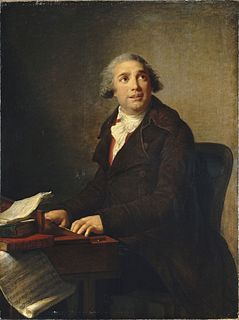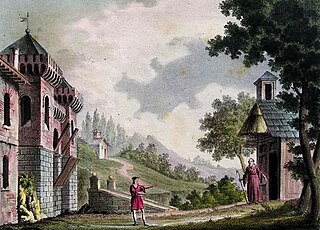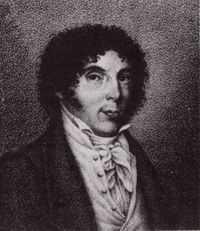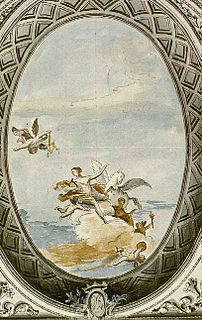
Giovanni Paisiello was an Italian composer of the Classical era, and was the most popular opera composer of the late 1700s.

Giuseppe Gazzaniga was a member of the Neapolitan school of opera composers. He composed fifty-one operas and is considered to be one of the last Italian opera buffa composers.
Giuseppe Farinelli was an Italian composer active at the end of the 18th century and the beginning of the 19th century who excelled in writing opera buffas. Considered the successor and most successful imitator of Domenico Cimarosa, the greatest of his roughly 60 operas include I riti d'Efeso, La contadina bizzarra and Ginevra degli Almieri. More than 2/3 of his operas were produced between 1800-1810 at the height of his popularity. With the arrival of Gioachino Rossini his operas became less desirable with the public, and by 1817 his operas were no longer performed. His other compositions include 3 piano forte sonatas, 3 oratorios, 11 cantatas, 5 masses, 2 Te Deums, a Stabat mater, a Salve regina, a Tantum ergo, numerous motets, and several other sacred works.

The Teatro Lirico is a theatre in Milan, Italy. In the 19th and early 20th centuries it was particularly notable for opera performances, including the world premieres of Donizetti's L'elisir d'amore and Giordano's Fedora. The theatre, located on Via Rastrelli, closed in 1998. However, a restoration project was begun in April 2007, and it was due to re-open in 2009 as the Teatro Lirico Giorgio Gaber.
Vincenzo Fabrizi was an Italian composer of opera buffa.

Joseph Schuster was a German composer.
Lo spirito di contradizione is an opera buffa in three acts by Pietro Alessandro Guglielmi.
Il ratto della sposa is an opera buffa in three acts by Pietro Alessandro Guglielmi. The Italian libretto was by Gaetano Martinelli.
La sposa fedele is an opera buffa in three acts by Pietro Alessandro Guglielmi. The Italian libretto was by Pietro Chiari.
Gennaro Astarita was an Italian composer, mainly of operas. The place of his birth is unknown, although he was active in Naples for many years. He began his operatic career in 1765, collaborating with Niccolò Piccinni in the writing of the opera L'orfana insidiata. He became the maestro di cappella in Naples in 1770.
Marcello Bernardini was an Italian composer and librettist. Little is known of him, save that he wrote 37 operas in his career. His father was most likely the composer Rinaldo di Capua.

Giacomo Domenico Mario Antonio Pasquale Giuseppe Tritto was an Italian composer, known primarily for his 54 operas. He was born in Altamura, and studied in Naples; among his teachers were Nicola Fago, Girolamo Abos, and Pasquale Cafaro. Amongst his pupils were the young Vincenzo Bellini around 1821, plus Ferdinando Orlandi. He died in Naples.
Carlo Franchi was an Italian opera composer known for his opere buffe. He belonged to the Neapolitan school of composers and it is likely that he was born in or near Naples, where his first opera La vedova capricciosa had its premiere in 1765. Subsequent works were performed in Rome, Venice, Mantua, Turin, Florence, and outside Italy in places such as Dresden and Lisbon.
Ferdinando Orlandi, also referred to as Orland and Orlando. Little is known of his early life and his year of birth is also cited as 1777. He was an Italian musician and teacher of singing who composed cantatas and sacred music, but was particularly known for his operas, not all of which have survived. He was born and died in Parma.
Giuseppe Filianoti is an Italian lyric tenor from Reggio Calabria.

Stefano Pavesi was an Italian composer.
Luigi Mosca was Italian composer of operas and sacred music and a noted singing teacher. He composed eighteen operas, most of which were originally for theatres in Naples, but played throughout Italy in their day.
Almerindo Spadetta was a prolific opera librettist active in Naples. He worked as a stage manager at the Teatro San Carlo, Teatro Nuovo, and Teatro del Fondo in Naples for over 40 years and wrote numerous libretti for composers associated with those theatres. His most enduring work was the libretto for Nicola De Giosa's Don Checco, one of the last great successes in the history of Neapolitan opera buffa.







